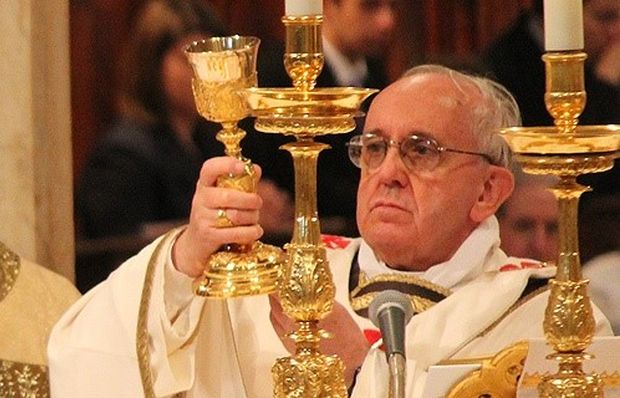First reason: I don’t go to Mass because Jesus’ sacrifice on the cross was once and for all.

The heart and soul of Roman Catholic theology and piety are to be found in the Mass. The Second Vatican Council’s Constitution on Sacred Liturgy (1963) underlined the importance of the mystery of the Eucharist describing it as a perpetual “paschal banquet in which Christ is eaten” (2:47).
Somewhat more recently, Pope Francis repeated the same idea at the 2013 Corpus Christi procession in Rome, stating: “Jesus this evening gives Himself to us in the Eucharist, shares our same journey- indeed, He becomes food, real food that sustains our life even at times when the going is rough.” And again, “It is listening to His Word, in nourishing ourselves with His body and His blood, that He makes us go from being a multitude to being a community.”
Both Francis and the Vatican Council are in evident accord. Jesus is to be eaten continually for faith to flourish in the world. I, however, am not convinced. Neither is the rest of the worldwide Protestant community. Let me explain why I (along with other Evangelical believers) don’t go to mass.
1.- I don’t go to Mass because Jesus’ sacrifice on the cross was once and for all.
In opposition to the dogma of the Council of Trent (1562), Bible-believing saints believe that Jesus was offered once and for all. He is not continually sacrificed every time a priest presides over the Eucharist Altar. Perhaps Hebrews 10:10-12 says it best when it highlights in no uncertain terms that Jesus’ body was offered “once for all” as “one sacrifice for sins forever” in contrast to the priests of Judaism who offered the same sacrifices perpetually which could in no way take away sins. Jesus offered Himself once. Only once! Full stop, period, end of story.
2.- I don’t go to Mass because Jesus’ sacrifice on the cross was perfect.
If Jesus’ atoning work was completely perfect then there isn’t any need for further sacrifices. The Roman Mass would only have value in the case that Jesus’ sacrifice on Calvary was in some way deficient or lacking. But who amongst us can find a fault in the blessed work of the Saviour? Did He not perfectly comply with the will of His Father? Were not His dying words on the cross “it is finished” (John 19:30)? The New Testament Jesus is all sufficient. There can be no ‘add-ons’ to His Gospel. Any such ‘add on’ is a distortion of the Christian message and a non-Gospel that distances people from wholly relying on King Jesus.
3.- I don’t go to Mass because I’m not a cannibal.
Roman Catholic theology misinterprets the institution of the Lord’s Supper by understanding Jesus’ words in literal terms: “Take eat: this is my body” (Matthew 26:26). Such terms are figurative, not literal. The bread and wine merely represent the body and blood of Christ. After all, when Jesus celebrated the Lord’s Supper, where was His body, His real body? It was there sitting amongst the disciples. Jesus wasn’t in a bread-basket waiting to be devoured by His hungry cannibalistic followers. The first disciples knew Jesus was speaking metaphorically. Other examples of figurative speech abound in the Scriptures i.e. Jesus is the door of life, the bright and morning star, the Alpha and Omega, etc. Who would be so senseless as to translate these terms literally? A literal interpretation of Jesus’ Eucharistic words turns us all into Jesus-eaters. God forbid! Away with transubstantiation at once!
4.- I don’t go to Mass because the Lord’s Supper is meant to be a spiritual affair.
In contrast to the complex philosophical constructs underlying the dogma of the Roman Catholic Mass, Scripture shows that the Lord’s Supper to be a remarkably simple affair containing spiritual recollection and hope. It is a thankful remembrance of what Christ did for us in the past and a joyful proclamation of His soon return. Paul combines these two elements (past and future) in 1 Corinthians 11:25-26 where verse 25 says that we partake of the Lord’s Supper “in remembrance” of Christ and verse 26 states that we do so, “till He come”. Of course we are aware of a special presence of the Lord wherever two or three are gathered together in His name; nevertheless, it is an entirely spiritual presence, not a bodily one.
Conclusion
So there you have it. I don’t go to Mass because Jesus offered Himself once and for all. I don’t go to Mass because Jesus’ atonement was perfect. I don’t go to Mass because I’m not a cannibal. And I don’t go to Mass because the Bible shows the true meaning of the Lord’s Supper shows it to be a specifically spiritual affair. The modern Mass is an invention of the Roman Catholic Church (at the Fourth Lateran Council in 1215 to be exact); not a correct rendering of the New Testament faith.

Las opiniones vertidas por nuestros colaboradores se realizan a nivel personal, pudiendo coincidir o no con la postura de la dirección de Protestante Digital.
Si quieres comentar o